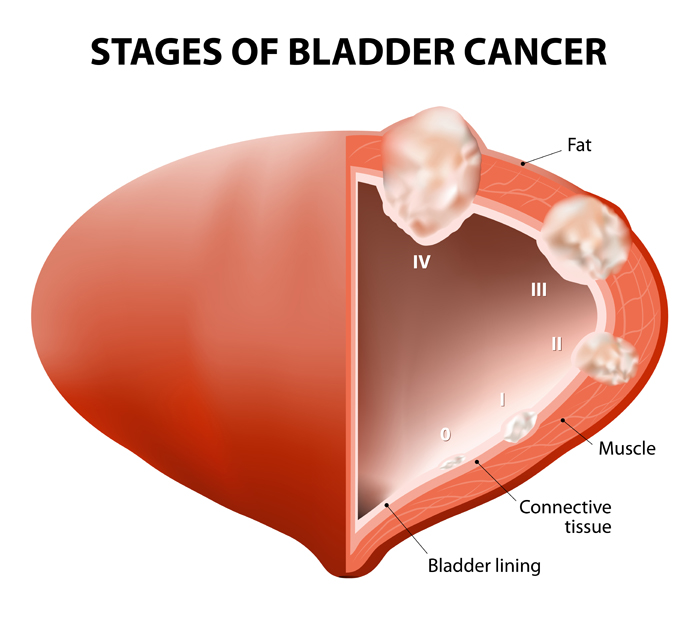Best Bladder Cancer Treatment & Diagnostics in Sadashiv Peth, Pune
When the cells inside the bladder- known as urothelial cells- become cancerous, it causes bladder cancer. It is one of the most common types of cancer and can be diagnosed at an early stage. The urothelial cells are also present in the kidneys and the uterus, however, it is more common in the bladder. This is a highly treatable condition. Therefore, if you come across the symptoms, it is important that you seek medical attention immediately. Generally, even after cancer is treated, one has to go for regular follow-ups to ensure it doesn’t recur.

Symptoms
- Presence of blood in the urine. It can be bright red or even the color of cola. Sometimes, blood doesn’t appear to the naked eye but can be found via a laboratory test.
- Painful urination
- Frequent urination
- Back pain
Request an appointment at Apollo Spectra Hospitals, Pune
Call 1860-500-2244 to book an appointment
Causes
Urothelial carcinoma:Also known as the transitional cells, they line the insides of the bladder. These cells help with the expansion and contraction of the bladder when it is full and empty. Cancer can begin with these cells sometimes.
Squamous cell carcinoma:These cells are connected to chronic irritation of the bladder. It can occur because of an infection, such as prolonged use of a urinary catheter.
Adenocarcinoma:These cells are found in the mucus-secreting glands in the bladder.
Risk Factors
- Smoking can damage the lining of the uterus
- People older than 55
- Men are more likely to suffer from bladder cancer than women
- Exposure to some chemicals
- If you have undergone a cancer treatment previously
- Chronic bladder inflammation
- History of cancer
Diagnosis To diagnose if the patient is actually suffering from bladder cancer, the doctor might conduct a few tests, and they are;
- Cystoscopy: A cystoscope, which is a narrow tube, is inserted through the urethra so that the doctor can see inside your urethra and the bladder to check for bladder cancer.
- Biopsy: During the cystoscopy, your doctor might also collect a sample for biopsy by passing special tools via a cystoscope for the same.
- Urine sample testing can be conducted to analyze the samples under the microscope to check for cancerous cells.
- CT urogram or retrograde pyelogram can be conducted. During the CT urogram, a medical dye is injected into the veins that flow to the kidney, uterus, and bladder. Then the x-ray shows the detailed view of the urinary tract, which is useful in detecting cancer. Retrograde pyelogram is similar to CT urogram.
Once the tests confirm the presence of bladder cancer, your doctor will conduct a few more tests to understand the extent of cancer. They are;
- CT Scan
- MRI Scan
- Positron Emission Tomography
- Bone Scan
- Chest X-ray
Once the scans are taken, it helps your doctor determine at which stage the cancer is and provide treatment for the same. The stages are indicated by Roman numerals 0 to IV, with IV being the highest.
Treatment
Some of the treatment plans your doctor might consider include;
- Surgery: Having surgery helps remove the cancerous cells.
- Bladder Chemotherapy: Chemotherapy is done in order to contain cancer and stop it from recurring.
- Radiation Therapy: When surgery is not an option, your doctor might recommend radiation therapy in order to destroy the cancerous cells.
- Immunotherapy: Here, the immune system of the body is strengthened to help fight cancerous cells.
- Targeted Therapy: This is usually the last resort when all other treatment options have failed.
Your doctor uses a single approach or a mix of two or more treatment methods based on the type of cancer the patient is suffering from.
References:
https://www.mayoclinic.org/diseases-conditions/bladder-cancer/symptoms-causes/syc-20356104
There is actually no guarantee that you can prevent bladder cancer. However, you can make a few lifestyle adjustments to reduce the risks, such as quit smoking, be careful around chemicals, and consume a variety of fruits and nuts.
If it is detected early, bladder cancers are highly treatable. If you notice any of the symptoms, it is advised to get tested immediately.
The type of cancer can be determined after a complete diagnosis by the doctor. So, talk to them if you notice any symptoms.


.svg)
.svg)
.svg)
.svg)









